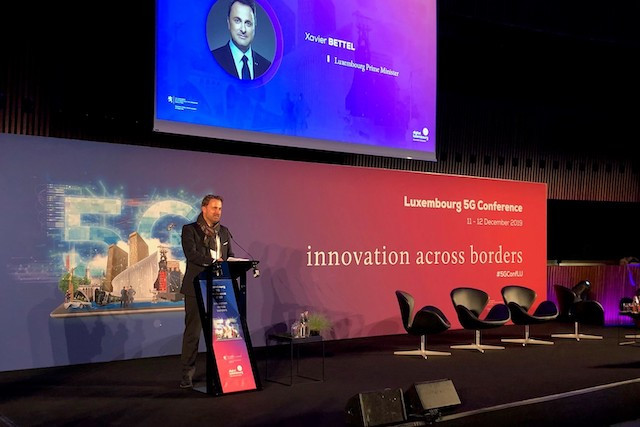Among those to open Wednesday’s conference was Luxembourg prime minister Xavier Bettel (DP). “We will do our best to meet the deadlines set out by the European Commission which is to allocate the frequencies by mid-2020,” he said, adding that the national networks would also be granted 330Mhz of spectrum, the equivalent of 50Mhz more than announced in the public consultation.
Bettel doesn’t see 5G as a technology of the future, rather Luxembourg is ready for deployment. What’s more, 29 projects which had been submitted for the 5G call were under review.
Following Bettel’s opening speech were three keynote speakers, each addressing the role 5G is currently playing in Europe, the US and Asia, and what implications that could have for Luxembourg.
5G in Europe
On a recent trip to Shenzhen, China, Fredrik Zetterlund, co-founder and EVP of OnePhone Group, did a speed test on the 5G network during a taxi ride. The network was 10 times faster than 4G (500 MB/s compared to 40 MB/s), with a mere 10 millisecond ping time, five times faster than the 4G network. As Zetterlund said, “That quick reaction on the 5G network is one of the key differentiators that will underpin new things, like vehicle control and completely new ways of doing things,” adding the experience was “in China…not in Europe.”
He reminded the audience that exactly 10 years ago, in December 2009, the world was talking about 4G technology as it was first rolled out in Stockholm and Oslo. “Europe was leading”, and even since then “the 4G evolution has been fantastic.”
But the challenges he sees for Europe include regulatory conditions, uncertainty of government policy, fiber infrastructure not being available, plus the case some could argue that with a 4G network being decent, why upgrade?
In Europe, “Switzerland has taken the opportunity to have a leader position, including 5G in rural areas.” Small countries broadly speaking show the most promise in 5G deployment. That includes Luxembourg.
Perspectives on US, Asia
Zetterlund called the US strategy “aggressive”, while Pradeep Bhardwaj, senior strategy director and head of industry standards at US-based Syniverse, talked about the “new world order”, comparing the paradigm shift created by 5G to that of electricity. Citing June 2019 figures from Open Signal, he explained the 5G download times in the US were 58% faster than the next fastest country (Switzerland).
But the regulatory and policy environment seems to be keeping pace, too. On 4 December 2019, the FCC rolled out a fund for rural 5G connectivity totalling $9bn--this in addition to its 5G “Fast” (Facilitate America’s Superiority in 5G Technology”) plan. The US also hasn’t minced words when it comes to its perceived threats to 5G. Earlier this year, US department of state’s cyber diplomat Robert Strayed warned companies of the risks on 5G tech, saying, “Vendors could be ordered to undermine network security--to steal personal information or intellectual property, conduct espionage, disrupt critical services or conduct cyberattacks.”
On the Asian front, South Korea, China and Japan are showing the most promising subscriber data, according to Chris Reznicek, LG Uplus, the last of Wednesday’s keynote speakers. By the end of December, a mere eight months after launch, South Korean subscribers alone are expected to increase by 5m.
For Reznicek, however, part of the challenge for companies is convincing customers of the value of 5G. It can then become a marketing challenge to convince users of the realm of implications there could be as multi-channel broadcasting, immersive media and cloud transform games, AR and VR experiences.
The sold-out 5G conference runs 11-12 December at the European Convention Center.
